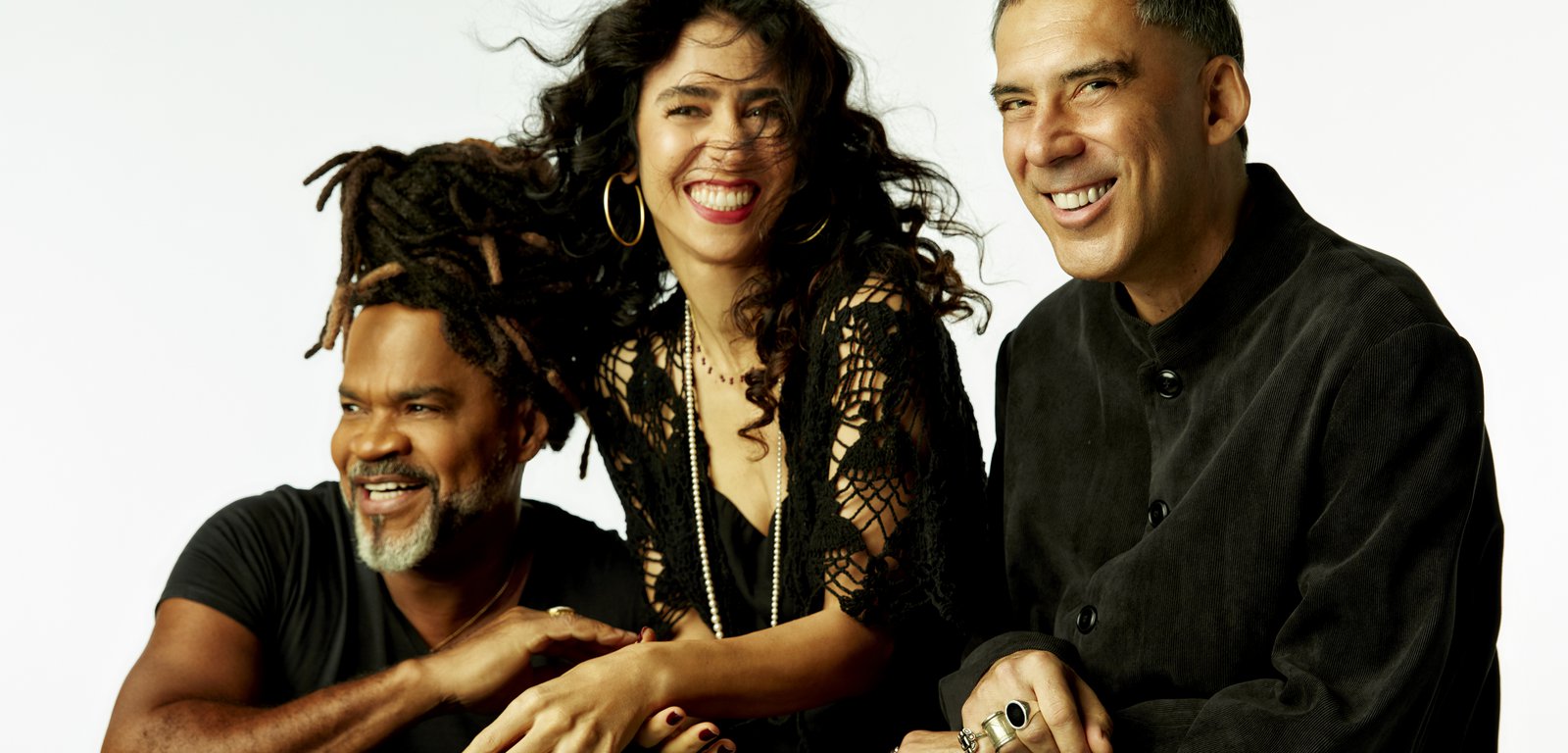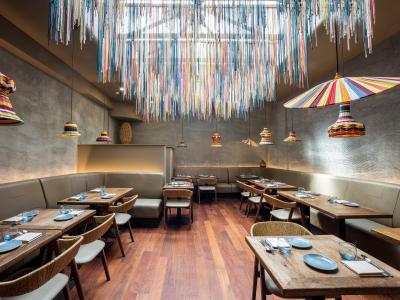Marisa Monte, Arnaldo Antunes and Carlinhos Brown were already mega famous artists in Brazil when, back in 2002, they got together in a beach house in Salvador da Bahia to enjoy their long-standing friendship and make some music. They released the results without commercial drive; demands for interviews and a promotional tour were dismissed, and the Tribalistas, as they called themselves, ‘disintegrated in the next moment.’
The result was the best-selling album of its generation - more than a million copies just in Brazil - with songs such as ‘Já sei namorar’, ‘Velha infância’, ‘Passe em Casa’ and ‘É você’ that marked a generation.
“We only wanted to record our encounters, which were very spontaneous and a natural consequence of our previous encounters. We did not have any expectation beyond that really,” Marisa Monte explains, adding that at the time she had also just given birth to her first son. ”But, of course, we were happy to see how the public reacted.”
Fifteen years later, the three friends meet up again: another album by the same name; the success, perhaps, predictable. But this time, at least, fans get to see them live.
“This second encounter was very much like the first: a celebration of our friendship and mutual admiration, with the aim of producing a record that reflects our joy of being together, without expectation, without commercial targets…but this time we did want to be more accessible to our audience.”
Indeed in the years that separate the two albums, much has changed in the music business.
The long awaited second album was released using digital platforms, broadcasting a live performance and Q&A sessions with fans between the songs. The two albums are primarily studio-works, but the Tribalistas also enjoy huge popularity as performers. Given the success of the first album, surely, I probe, they must have great expectations for this one?
‘There is no commercial expectation,” Marisa insists. “This album was born out of a musical intimacy that has been growing between us over the past 25 years, the sheer pleasure of being able to do together what we cannot by ourselves alone; a collaboration of composers who are friends, searching for good communication through music.’
I make a remark about the language that all three artists use - spontaneity, joy, intimacy, affection, respect, syncretism, simplicity, tolerance, unpretentiousness - Arnaldo Antunes laughs: ‘I guess, these are the words we use because they reflect what we all feel and that we are connected!’
Indeed, all the songs on the album are signed by the three of them and the second album confirms the result of this unique connection; the distinctive Tribalistas sound. Like the first album, the arrangements work as a kind of extended version. But the spontaneity is not without its labour Marisa elaborates:
“Although the songs seem simple, there is a decanting process that reflects more than the moment of the meeting. Creating musical intimacy does not happen overnight, we’ve had many years of working together, beyond Tribalistas. The other day we were counting how many songs we've written together and realized that we have 53 songs. And that’s not including those in which only two of us were involved. It was only in 1998 that we found the chemistry that would lead to the Tribalistas.”
Intertwining Histories
The beauty of the trio is in the contrast between the artists: the carioca Marisa comes from the traditional MPB (Brazilian Pop Music) with ballads steeped in the samba tradition from Rio de Janeiro, the paulistano Arnaldo Antunes hails from the 1980s rock group Titãs, and the baiano and multi-instrumentalist Carlinhos Brown brings the rhythms of Brazil’s African diaspora.
Marisa Monte had already recorded a version of Arnaldo Antunes’ Titãs hits in her second album, Mais (1991), where their co-compositions also appear for the first time. This is the period when Arnaldo goes on a solo career after 10 years with Titãs. Marisa's partnership with Carlinhos also started around that time, and in 1998 she was already producing Brown’s second solo album ‘Omelete Man.’ Brown and Antunes started their collaboration on Antunes’ 1998 album Um Som, with the song ‘Doce do Mar’ and Marisa also recorded songs by Brown and Antunes in other studio albums such as the 1994 Verde, anil, amarelo, cor de rosa e carvão.
I’m interested to know, what was the first song they all wrote together? Without hesitation. Marisa Monte replies: “‘Água também é mar’ which I recorded on my 2000 album. It’s a special one and could not be left out of the set list of this tour. There is also ‘Não é fácil’ in that same record.”
“Tribalistas, as we know it, started around that period. We got together for a week at Carlinhos' place in Bahia and started to write a lot of pieces and also re-write and finish melodies that had remained on cassette tapes,” Marisa continues. “The song ‘Já sei namorar’, for example, is from the period of my album Mais. I had asked Arnaldo to write lyrics for it and for what later became ‘Beija eu’, which was one of the big hits of that album, but another tune was kept in the cassette and in 2002, I showed the melody to Arnaldo again, and this time he managed to finish the song. It ended up being one of the main hits of the first Tribalista album.“
While the first album was released in the music industry’s twilight years of huge CD sales, the second release is in an era of mobile device, downloads and easy piracy. How did this affect the way they thought of distributing the second album?
Arnaldo Antunes:“We wanted to surprise the public by releasing the album live on the internet. It's a surprise to see this direct, instant communication and response. We were not used to that. But it’s amazing to see that, when we play live, people know and sing the songs from both albums, and that they know songs by heart that aren’t related to us individually, but composed by the three of us.”
The Sum of Tribes
It’s no surprise that Tribalistas appeals to a massive audience, when each of these artists accrued huge record sales on their own in the 20th century MPB era. The musicians describe Tribalistas like a filter that extracts the pure form from their combined musical baggage. But more than the sum of their individual success, is the sum of the different regions in Brazil they represent, making them truly national. This idea ignites Carlinhos Brown to intervene:
“This mix of our nuances is something really relevant. The way Arnaldo says a word is different from Marisa's accent or my Bahian way of speaking, singing and playing. Each one of us represents the different elements that makes Brazil; this miscegenation that gave rise to Brazil’s unique ethnic outcome. We are the voice of our ancestors, the diasporas that created this culture.”
During the creative process, they explain, they start with one song to which each contributes ideas. Brown plays over 30 different instruments, such as handmade electronics, body percussion, cajon, afoxés, karkabou, bacurinha, beatbox, berimbau, shaker, Tenori-On, bagpipe, rain stick, cowbell, and even a laughter solo. He explains:
“For me percussion is an agent of memory. This rhythmic and oral voices that have passed through generations, and make our music. This, in my view, is the Brazil that works, its success. People come and study Brazilian music and percussion, but to me it is part of my experience, the experience of being Brazilian and Bahian. The samba schools, the cordões, is a type of education that represents us all; it is our contribution to a world that focuses too much on information but actually needs to be re-educated culturally. Our musical tradition is, in this sense, is a redemption of our history.”
However, the Afro-Brazilian percussion is not what stands out on the songs, I point out, where the main instrument is almost always the guitar. Brown clarifies:
“In our partnerships, the guitar has a remarkable presence. We rely on it most of the time. This is a great part of the Brazilian musical tradition too; carrying the guitar under your arm to meet up and play music with friends. In our case, Marisa has a way of playing the guitar that is also very percussive.”
Marisa adds: “But sometimes it's not the guitar that starts the creative process. The song that opens the album, Diásporas, came when the Brown was playing the piano. That sound brought us to the theme and the lyrics started to flow. We connected with those verses by Castro Alves and Sousândrade, who had already written poetry about diasporas in Brazil in the 19th century.”
As with the musical greats before them, Chico Buarque, there seem to be a great connections with poetry, literature
“The theme of diasporas is not a contemporary one, but very much part of what we are as human beings.” Marisa continues. “We look to poetry of our great writers whenever we can, to spread messages that have lost space. Music has this power to communicate with many people, but many things contribute to music, and literature is one of them, because great literature has a different way of looking at things.’
Both the references to poetry and the themes that Tribalistas touch, one cannot help make parallels with the Tropicalistas, the creative movement of the late 60s of which Caetano Veloso, Gilberto Gil and Chico Buarque were part, which celebrated the Brazilian melting pot through music, art and literature. It also made these artists enemies of the state, and forced them into exile.
The Tribalistas never overtly talk about politics, yet in an era of deep concern about democracy and increasing political hate rhetoric in Brazil, and abroad, what the Tribalistas represent, their very approach, is powerful, and yes, political. Perhaps the Tribalistas are a tribute to the Tropicalistas? But Marisa is the first to refute this idea:
“We are not Tropicalistas. We do not intend to be a movement, as our lyrics say:
Tribalism is an anti-movement
That will disintegrate in the next moment
Tribalism can be and should be what you want
You do not have to do anything just be what you are
We are aware or our time and we are also products of this time, but we do not have the same concerns that the Tropicalistas had. We have a respect and admiration for them and for that period of creativity, which we grew up with. But our time is different.
Tribalismo is not Tropicalismo. We are not a ‘thing.’ This thing of the future is part of the past now.”
Indeed the appeal of Tribalistas is in what they are and do, not what they preach; three individuals with a desire to compose and play together, to create beauty, to see the beauty in others, to share.
Tribalistas will be playing in London on the 4th Nov at the Hammersmith Apollo. Tickets here: https://serious.org.uk/events/tribalistas
















